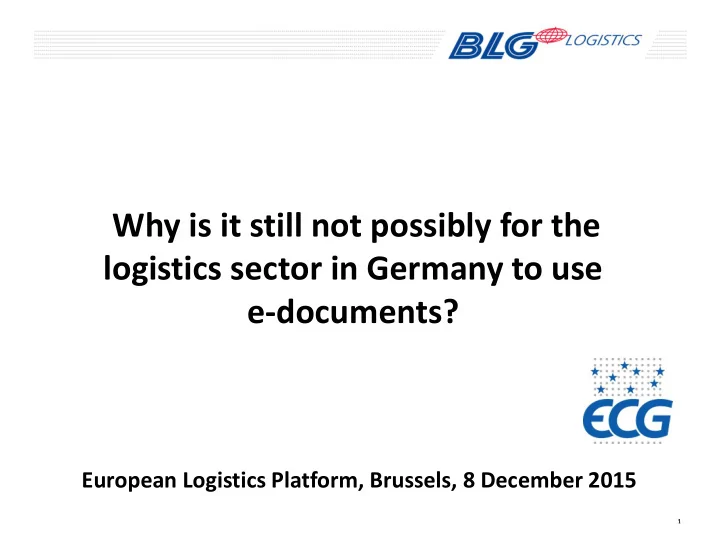

Why is it still not possibly for the logistics sector in Germany to use e-documents? European Logistics Platform, Brussels, 8 December 2015 1 1
BLG LOGISTICS GROUP D IVISION CONTRACT CONTAINER AUTOMOBILE automobile parts logistics terminal network sea & inland terminals industry- & production intermodal transport distribution & storage ro/ro terminals logistics cargomodal services retail logistics maintenance & repair technical centres intermodal transport port logistics depots Wind Energy Logistics forwarding 2 2
BLG AUTOMOBILE LOGISTICS network River Barge service Railway transport Truck transportation Sea Port and Inland Terminals
BLG AUTOMOBILE LOGISTICS F ACTS AND F IGURES 2014 Leading automobile logistics provider in Europe Worldwide logistics for finished vehicles Customer portfolio: BMW, Daimler, VW-Group, Kia, Mitsubishi, Suzuki, Chrysler, Porsche, PSA, Hyundai, Gefco, Ford, Renault-Nissan, Fiat, Europcar, Hertz, Landrover, Volvo, Opel, etc. Turnover 434, 7 million EUR Employees 3.081 employees Handled vehicles 7,4 million vehicles Port terminals 2,7 million vehicles Inland terminals 1,2 million vehicles Technical treatment 1,4 million vehicles Intermodal transportation 1,5 million vehicles Forwarding 0,6 million vehicles 4 4
= 2 Mio. = 1 Mio. BLG = 16, 5 Mio. = 33 Mio. Europa = 200 = 135 t 5 5
1. Consignment notes a) Legal situation according to the German Commercial Code ( Handelsgesetzbuch - HGB ) The German Commercial Code generally provides for the issuance of transportation documents in paper form . In April 2013 new regulations were added to the Code so that electronic consignment notes, electronic bill of ladings and electronic warehouse warrants are – generally speaking – permissible under German Law. However, the HGB adds that electronic transport documents are only permissible if authenticity and integrity of the records are ensured and will be preserved. Electronic transport documents must furthermore ensure the equivalence with the conventional paper transport document. This is a very vague notion! The German Government is entitled to regulate the details of the electronic transport documents with a governmental regulation . Unfortunately such regulation is not yet available . Due to the current uncertainty of electronic transport documents regulations it is not advisable for companies at this stage to use electronic transportation documents. 6 6
b) Legal situation according to the CMR Convention Art. 5 of the UN CMR Convention foresees a consignment note in paper form. In 2011 an additional protocol to the CMR was adopted, introducing an electronic consignment note (the “ e-CMR Protocol ”). So far Germany did not ratify this protocol (only 8 EU countries did + Switzerland) Therefore, the use of an e-CMR consignment note is not possible – neither within Germany for national transport, nor for international transport (cf. Denmark and Netherlands, which both adopted the e-CMR Protocol). We strongly like to recommend to find a quick solution that all Member States will sign this additional protocol! 7 7
2. Receipt (Proof of Delivery) The German Commercial Code and the CMR do not provide rules for a proof of delivery by way of a receipt. The German Freight Forwarders' Standard Terms and Conditions (ADSp) state that the carrier must require a receipt as proof of delivery by the recipient. The ADSp do not provide particular requirements for the form of this receipt. - Electronic receipt (e.g. on a tablet) is legally possible ! - Will it have the same value as paper in case of court proceedings? - How to secure a regular recording and no manipulation of the original? - Will a printout of an electronic receipt have the same probative force? Several requirements – both legal and operational – need to be fulfilled to avoid any disadvantages. I.e. the electronic receipt should have a file protection system that ensures the receipt against subsequent manipulations. The system should also have a logger that records every step of the system. IT service providers have not yet come forward with appropriate solutions! 8 8
3. Conclusion At this stage the use of electronic transport documents in Germany is still not advisable. Unless the Government issues a regulation on the details of electronic transport documents, the uncertainties, whether an electronic transport document is “equivalent” to a transport document in paper form, remain. Under the CMR Convention, electronic transportation documents would only be useable if the e-CMR protocol from 2011 would come into force. It would therefore be essential that more member states ratify this additional protocol, especially Germany. The (German) logistics sector is ready, but legal certainty is needed! Perhaps the European Commission’s Digital Transport and Logistics Forum (DTLF) can help? 9 9
Thank you very much for your attention! 10 10
Recommend
More recommend